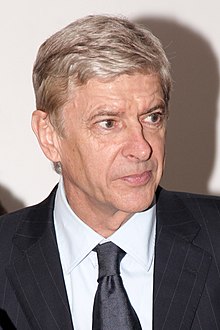Arsene Wenger is a French football manager and former player who is widely regarded as one of the greatest managers in the history of English football. He was born on October 22, 1949, in Strasbourg, France.
As a player, Wenger began his career at AS Mutzig in France before moving to RC Strasbourg in 1970. He played for Strasbourg for seven seasons before moving to AS Nancy in 1973. He retired from playing in 1981 and began his coaching career.
Wenger’s coaching career began in France, where he managed several clubs, including AS Monaco, Nancy, and AS Cannes. In 1995, he became the manager of Nagoya Grampus Eight in Japan, where he spent two seasons before being appointed as the manager of Arsenal in 1996.
During his time at Arsenal, Wenger revolutionized English football with his innovative tactics, scientific approach to training and conditioning, and his emphasis on nutrition and sports science. He won three Premier League titles and seven FA Cups with Arsenal, including two league and cup doubles in 1998 and 2002. He also led Arsenal to an unbeaten Premier League season in 2003-04, a feat that had not been accomplished since the 19th century.
Wenger is known for his ability to discover and develop young talent and for his philosophy of playing attacking and attractive football. He was a pioneer of the use of data and statistics in football, and he also introduced new training methods, including the use of video analysis and a new focus on nutrition and diet.
Wenger left Arsenal in 2018 after 22 years as manager, and he has since worked as a television pundit and consultant. He is also involved in various charity and philanthropic endeavors, including the establishment of the ‘Arsene Wenger Foundation,’ which supports a range of projects related to football, education, and health.
Throughout his career, Wenger has received numerous awards and accolades, including the LMA Manager of the Year award three times and the UEFA Manager of the Year award twice. He was also made an Officer of the French Legion of Honour in 2002 and was awarded an honorary OBE by Queen Elizabeth II in 2003.
Arsene Wenger’s record at Arsenal:
During his 22-year tenure as Arsenal manager from 1996 to 2018, Arsene Wenger achieved a number of remarkable accomplishments and set numerous records. Here are some highlights of his record at Arsenal:
Wenger managed Arsenal in 1,235 games, winning 707, drawing 280, and losing 248, giving him a win percentage of 57.2%.
Under Wenger, Arsenal won three Premier League titles, in 1997-98, 2001-02, and 2003-04, and finished as runners-up on five other occasions.
Wenger led Arsenal to seven FA Cup victories, in 1998, 2002, 2003, 2005, 2014, 2015, and 2017, which is a record for any manager in the competition.
In the 2003-04 season, Wenger guided Arsenal to an unbeaten league campaign, the first and only time a team has achieved this feat in the Premier League era.
Wenger also took Arsenal to the Champions League final in 2006, where they were beaten 2-1 by Barcelona.
During his time at Arsenal, Wenger developed a reputation for developing young talent, and he oversaw the development of numerous star players, including Thierry Henry, Patrick Vieira, Cesc Fabregas, Robin van Persie, and many others.
Wenger’s time at Arsenal was marked by his commitment to playing an attacking and attractive brand of football, which made him a popular figure among fans.
Overall, Wenger’s record at Arsenal was one of remarkable success, innovation, and achievement, and he is widely regarded as one of the greatest managers in the history of English football.
Here are some famous quotes by Arsene Wenger:
“Football is an art, like dancing is an art – but only when it’s well done does it become an art.”
“The only thing you can do in life is to try to be happy. That’s it. It doesn’t matter how many trophies you win or how many games you win, if at the end of the day you don’t feel happy, then there’s no point in doing it.”
“I believe in work, in connections between the players, I think what makes football great is that it is a team sport. You can win in different ways, by being more of a team, or by having better individual players. It is the team ethic that interests me, always.”
“You have to work more than your adversary. You have to be ambitious, you have to be passionate about what you do, and you have to have a very strong work ethic.”
“My job is to give people who work with me a chance to be the best they can be. I try to help them find what they need to do to achieve their objectives, and to achieve their objectives with the team.”
“A manager is a guide. He takes a group of people and says, ‘With you, I can make us the best in the world.’ It’s a spirit.”
“I believe that every single person has to achieve their dream, whether it be a football player or a businessman. It’s just a matter of finding the right way to get there.”
These quotes reflect Wenger’s philosophy on football, teamwork, and leadership, and his emphasis on hard work, passion, and the pursuit of excellence.
Here are some famous quotes about Arsene Wenger by others in football:
“Arsene Wenger is probably the best manager that Arsenal have ever had.” – Thierry Henry
“He revolutionised the Premier League. He was ahead of his time, he was a visionary.” – Cesc Fabregas
“He’s one of the great managers. You talk about the modern era, he’s up there with the best of them.” – Sir Alex Ferguson
“I have enormous respect for Arsene. He has brought a lot to English football and for Arsenal he is a great man.” – Jose Mourinho
“Arsene Wenger is a football visionary. He has changed the game in England and played a major role in the globalisation of football.” – Pep Guardiola
“Arsene Wenger has made an enormous contribution to English football.” – Sir Bobby Charlton
“Arsene Wenger changed the culture and style of football not just in England but in Europe as well.” – Gary Neville
These quotes reflect the immense respect and admiration that Wenger commands among his peers in football, and highlight his pioneering approach to the game, his impact on English football, and his status as one of the all-time great managers.

